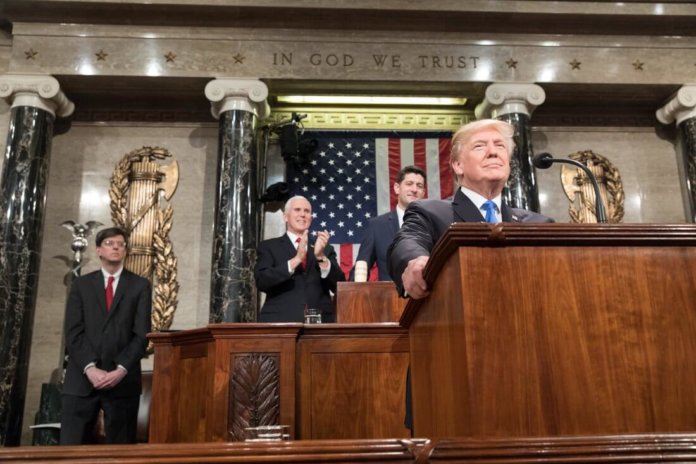The Mexico border wall, nuclear arsenals, Guantanamo Bay – President Donald Trump covered a number of controversial topics during his first State of the Union (SOTU) address on Tuesday night. However, the president’s only and very brief remark about energy has garnered a lot of backlash from environmental and clean energy advocates.
In his address, Trump said, “We have ended the war on American energy, and we have ended the war on beautiful clean coal. We are now very proudly an exporter of energy to the world.” Notably, an earlier White House preview of the prepared SOTU speech did not include the word “beautiful” when discussing coal, suggesting the president may have added the off-script adjective live.
In a SOTU fact-check piece from NPR, the news organization’s Jeff Brady wrote, “It’s difficult to make the case that there’s been a ‘war on American energy.’ Domestic oil production boomed and natural gas production increased steadily during Obama’s term. Trump has celebrated the fact that a few coal mines have opened since he took office, but only a small segment of the industry associated with making steel is growing – overall the industry is still declining.”
Brady added, “Finally, there have been efforts to make coal burn cleaner and reduce its contribution to climate change – it’s not clear whether that is what the president means by ‘clean coal.’ In any case, those efforts have faltered, mostly for economic and technical reasons, despite large government subsidies that also undermine the argument that there’s been a ‘war on clean coal.’”
Trump also did not mention in his address renewable energy or climate change, both of which he has historically criticized. The president’s coal remark is largely unsurprising, though, given that his administration has taken several actions to roll back regulations and support the fossil fuel. For example, the Trump administration is working to repeal the Clean Power Plan and had unsuccessfully pushed for what critics deemed a “bailout” for coal-fired and nuclear power plants. Trump’s affinity for coal continues despite the facts that analysts suggest coal’s decline is largely due to cheaper natural gas; cost-effective renewable energy is increasingly becoming a larger part of the country’s energy mix; and the solar and wind power industries have proven to be major job creators.
In a response to Trump’s speech, Rob Sargent, clean energy director of advocacy group Environment America, said, “We wish the president would not act like a cheerleader for outdated dirty fuels like coal while putting the brakes on clean, renewable energy like solar and wind.
“Renewable energy is virtually unlimited and pollution-free, protecting our communities from global warming and other harmful pollution,” Sargent continued. “America needs a rapid transition to clean, renewable energy, and we’re asking our leaders to get on board.”
In a heated statement, Sierra Club Executive Director Michael Brune claimed, “Under Donald Trump, the State of our Union is polluted.”
“Trump’s false claims tonight about his destructive energy policies are emblematic of his presidency, in that the weight of reality and the will of the people are not on his side,” said Brune. “Trump again tried to claim that coal is not in decline and spin his attempts to drill, mine, and frack our public lands and waters. The truth is that a coal plant retirement has been announced every 16 days since he was elected, and the American people overwhelmingly oppose his repeated attacks on our public lands.”
Expecting Trump to laud fossil fuels during the SOTU, the Natural Resources Defense Council (NRDC) had also issued a statement prior to the speech.
“The president wants to make America ‘energy dominant’ only by ramping up fossil fuels,” argued Ana Unruh Cohen, NRDC’s director of government affairs. “But he’s utterly ignoring the real dominance, the exceptional growth of clean energy. Already, 3 million Americans go to work across the country each day to wind, solar and energy efficiency jobs. And the sky’s the limit on further clean energy growth – that is, if Trump doesn’t get in the way.
“He shouldn’t. We need to cut the fossil fuel use that’s damaging our health and climate. And we need to accelerate, in every way possible, the transition to clean energy that will provide good jobs, a safer climate and a healthier future for our children.”
Perhaps surprisingly, Trump did not specifically mention or tout his administration’s new Section 201 trade tariffs on solar products or washing machines during the speech. Rather, he simply reiterated his long-time pledge to be tough on trade, in general.
“America has also finally turned the page on decades of unfair trade deals that sacrificed our prosperity and shipped away our companies, our jobs, and our wealth,” the president said. “Our nation has lost its wealth, but we’re getting it back so fast. The era of economic surrender is totally over. From now on, we expect trading relationships to be fair and, very importantly, reciprocal.”
He added, “We will work to fix bad trade deals and negotiate new ones. And they’ll be good ones, but they’ll be fair. And we will protect American workers and American intellectual property through strong enforcement of our trade rules.”
Although the Solar Energy Industries Association (SEIA), a major opponent to the Section 201 solar tariffs, did not issue a statement regarding the SOTU, the group recently spoke out against Trump’s similar trade remarks made during a speech to the World Economic Forum in Davos, Switzerland, last week.
“We share President Trump’s goal of free and fair trade, and we would support any efforts toward a negotiated solution to solar trade issues. However, his decision to impose punishing tariffs are not consistent with his goal of putting America First,” charged Abigail Ross Hopper, SEIA’s president and CEO, last week. “These tariffs do not ‘protect the interests of our country, our companies, and our workers.’ Quite the contrary, American companies will be forced to scale back investment, lay off workers and, in some cases, shutter operations because of these tariffs.”
Hopper added, “We look forward to working with the president, members of Congress and all stakeholders to reduce or moderate the negative effects of the president’s solar tariff decision.”
The full SOTU address is available here.
Photo courtesy of the White House website




